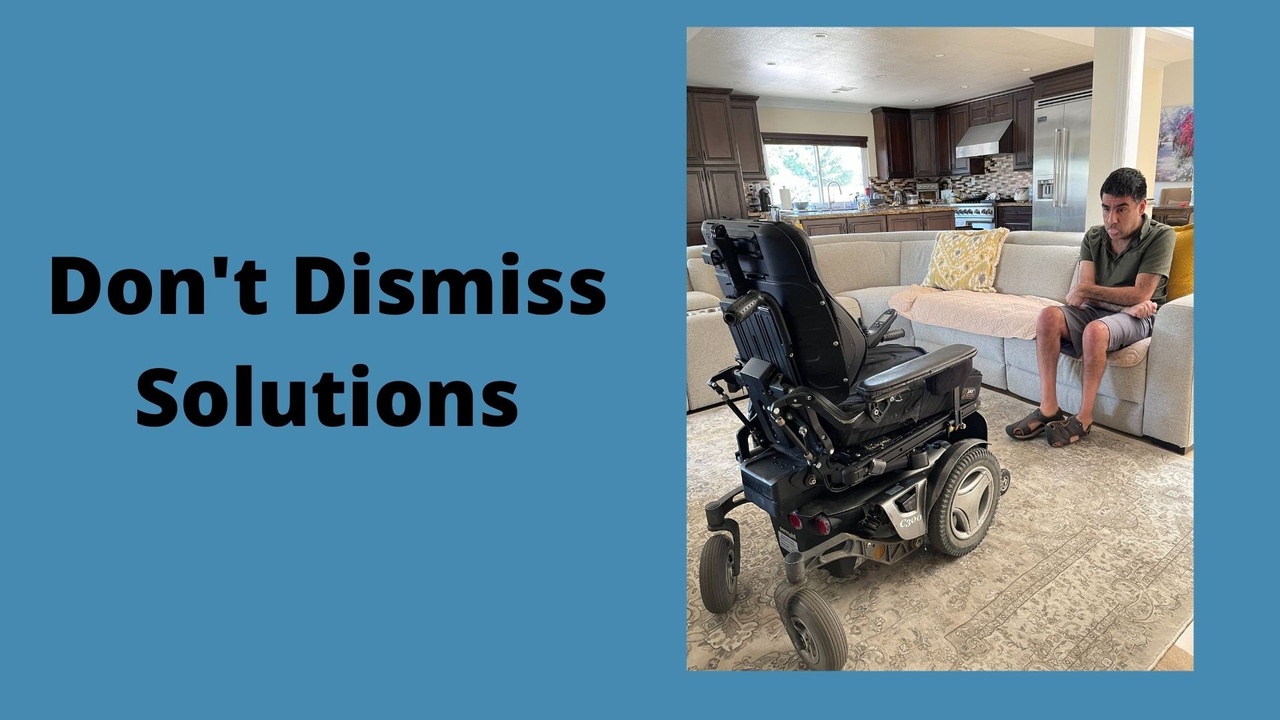Don't Dismiss Solutions

When we don’t understand why a solution was invented, it’s easy to confuse it with the problem it was created to solve.
I noticed this when discussing the concept “what is your wheelchair?” with my team. In short, this neat thought-experiment suggests everybody struggles with something that holds them back. But this doesn’t quite fit. The way I see it, the wheelchair is part of the solution to the problem not the problem itself.
After all, without my wheelchair I couldn’t even get to the living room of my own house. But just because it works does not imply my wheelchair is the perfect solution. It’s bulky. It’s expensive to fix. It scuffs my walls and can only be transported a special van. Yet there is a big difference between resenting my wheelchair and resenting the need to use it. We need to separate the solution from the problem.
Thinking carefully about solutions is the key to getting on the path to success, even though we’d often prefer not to think about solutions at all. Here’s a few reasons why:
Work
Most solutions require work. Building your narrative, upgrading your skills, getting over a psychological barrier, calling a plumber, going to a psychologist, admitting fault. While these are all part of getting you on the path to amazing, going after your dreams takes effort. And sometimes, laziness can get the better of us.
No perfect solutions
It is natural to expect a smooth and seamless solution, but most answers will never be a magic bullet. Challenges are complex and finding solutions is more like putting together a puzzle than flicking a light switch. For example, while my wheelchair softens the impact of my mobility challenges, it can’t help me with typing or phone calls. Likewise, wrapping a broken arm in a cast will certainly mend the bone, but it will take weeks to heal completely (not to mention the itchiness). No single solution can ever fix a problem, but each little fix will help your life improve slowly.
Input from others
Humans are social beings. We take cues from our friends, family and other people. That’s a good thing. But sometimes this copying means everyone unconsciously holds each other back, like crabs grabbing at their colleagues trying to escape a bucket. Unfortunately, many people in your life won’t want you to change. They might not say so directly, but in truth they like you just the way you are. They fear that if you change you might leave them behind.
Ego
Solutions are quickly rejected when they conflict with our preconceived notions about how to handle a challenge. Our ego is only doing its job of protecting us from pain (since change can hurt) but it’s important to remember that the ego can also divert us from finding better ways of doing things.
Not stepping back
If you can’t slow down and look at a challenge from a different angle, how can a solution ever arrive? Some great ways to encourage a new perspective is by taking a walk to clear your head or disappearing to a cabin for a couple of days. It could also mean picking up a book to give your mind a well-needed break. Often, just like magic, a solution can just pop into your head.
Ongoing work
Just as an athlete takes a run-up before leaping a hurdle, solutions often require taking one step back to take two steps forward. Of course, while this may make your life temporarily worse, a good investment doesn’t mature overnight. All investments demand sacrificing something today for future results. For example, it is unreasonable to expect to fit a slim pair of jeans after only a week of going to the gym. And keeping that weight off will require cutting out the salt, which means you may never eat fries again.
Sales tricks
We are bombarded by fake solutions, “short-cuts” and “secrets.” It’s tempting to buy into these hacks, but they only result in losing focus and clarity. Real improvement only comes from doing the work and not being distracted by shiny new objects. Snake-oil businesses try to capture your attention by making their solution sound easy, when it is nothing of the sort. They always forget to mention that plenty of hard work is needed to improve your life.
Upstream Solutions
Prevention, as the old saying goes, is the best medicine. In his book Upstream, Dan Heath says short-term thinkers often fail because they do not plan for the future. The insurance industry is built on long-term thinking. Eating healthy, saving for retirement and caring for one’s mental health are all great examples of long-term “upstream” solutions. This way of thinking is the reason I want my two boys to learn how to make better decisions, not to discipline them for discipline’s sake. Thinking about upstream solutions mean you can sidestep problems rather than running headlong into them.
To deal with obstacles, you must be willing to explore any solution that has even a tiny possibility of getting you back on the path to amazing. It is far too easy to complain, nitpick and dismiss solutions than taking the risk to see if they work. But there’s no other way to win.
Let's Stay in Touch!
Join my newsletter. I've love to update you on news about me and ways to stay motivated.
By submitting this form, you agree to receive ongoing updates from Sourena Vasseghi


